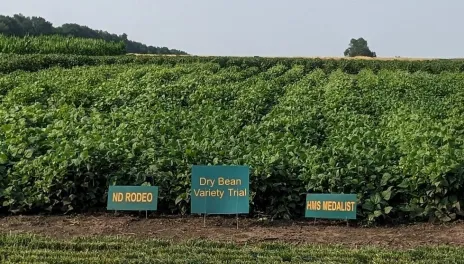To be or not to be: variety trial entries
Ever wonder why one variety and not another is in a variety trial? Do you wonder who submits the entries, to whom entries or suggestions are made, or who makes the final decision to include a variety?
Let’s start with who submits entries. Entries are submitted primarily by private breeding company representatives, public breeding programs such as state universities and the USDA (United States Department of Agriculture), and licensed seed distributors. The RECs (Research Extension Centers) require the entries be publicly available within a year. If producers want to see a particular varietal entry in a field test near them, producers should make that request of their seed suppliers.
The next question is to whom entries and questions should be directed. The answer is varied and depends on the crop. Small grains and dry edible beans are statewide trials, coordinated by their respective NDSU (North Dakota State University) breeder:
- spring wheat – Andrew Green
- durum – Elias Elias
- barley – Richard Horsley
- oat – Mike McMullen
- winter wheat – Francois Marais
- dry bean – Juan Osorno
The Carrington REC is the statewide coordinator for field peas.
The remaining crops do not currently have a statewide coordinator and entities wishing to test their varieties must contact each REC for information and for entry instructions.
To the last question -- who decides what varieties are planted? Statewide breeder/coordinators distribute recommended lists to each REC, sometimes with seed and sometimes without. Each REC makes the decision to keep or veto a variety depending on variety characteristics, production acreage, seed availability, space availability and staffing resources.
The spring small grain lists are distributed in late February. This year those lists contained 66 entries of HRSW, 15 entries of barley, 21 entries of oat, and 24 entries of durum. The last day for field pea entries is typically March 15 so those entries will be finalized soon. The dry bean list is not usually distributed to the RECs until mid to late April.
As mentioned previously, corn, sunflower, canola, and soybean variety trials do not have statewide trials; however, several RECs have collaborated to simplify entry into Hettinger, Carrington, Langdon, and Williston variety trials using a common website. Entry into trials coordinated by the North Central (Minot) or Dickinson REC is made by contacting them directly.
What about other crops? Depending upon interest, the Carrington REC conducts a number variety trials for crops such as flax, rye, crambe, camelina, buckwheat, corn silage, and various forages. Please ask if you are interested in these variety trials.
If you are interested in seeing a particular variety grown in the variety trial, ask your seed representative to enter it. The entry deadline for soybean, corn, sunflower, and canola is March 24 this year!
All results are published in both print and electronic format (https://vt.ag.ndsu.edu/).
Kristin Simons, Ph.D.
Kristin.Simons@ndsu.edu
CREC Research Agronomist
